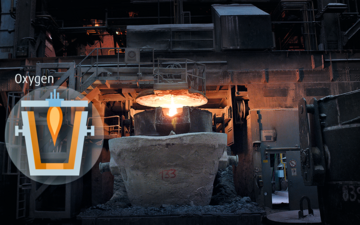Process Optimisation
Industrial manufacturing processes, particularly those requiring high temperatures, remain some of the toughest areas to decarbonise

Industrial manufacturing processes, particularly those requiring high-temperatures, remain some of the toughest areas to decarbonise, and will need long-term strategies. When devising a decarbonisation strategy, it makes sense to consider the achievable, low-risk steps first. When looking at alternative solutions that will enable industry to endure rising costs and reduce carbon emissions whilst waiting for hydrogen, there is an immediate option of improving process efficiency using oxygen.
Oxygen benefits
Existing, proven technologies can be implemented now, which can significantly reduce fuel consumption. For industrial decarbonisation, the use of oxygen increases fuel efficiency, which in turn reduces carbon emissions and is therefore a useful solution for industries transitioning to net zero.
While complying with environmental standards, the use of oxygen has numerous financial benefits. The use of oxyfuel reduces the amount of natural gas needed, reduces the carbon emissions and associated costs, and lastly improves the lifespan of combustion machinery.
Oxygen can offer a more immediate means to decarbonise many hard-to-abate processes such as steel, gas and lime production. BOC is experienced in delivering oxyfuel solutions and supporting technologies to industry, in order to minimise energy consumption. Process intensification allows business to do more with less, leading to long-term operational cost savings and providing stability for business practices amid the net zero transition.
How can the use of oxygen help reduce emissions?
Oxy-fuel combustion is a well-established technology and has an important role to play in reducing emissions in the short-term.
By using pure oxygen to burn fuel, the process uses oxygen rather than air as the primary oxidant. Given the nitrogen component of air is not heated, it reduces the fuel consumption levels, enabling higher temperatures. Depending on the nature of the process it is possible to reduce fuel consumption by between 10% and 50%, with a consequent reduction in carbon emissions.
Through the innovative use of oxygen applications such as BOC's OXYGON® and REBOX®, BOC are helping organisations to take the first steps to decarbonise and enable them to extract the maximum benefit for their business.
